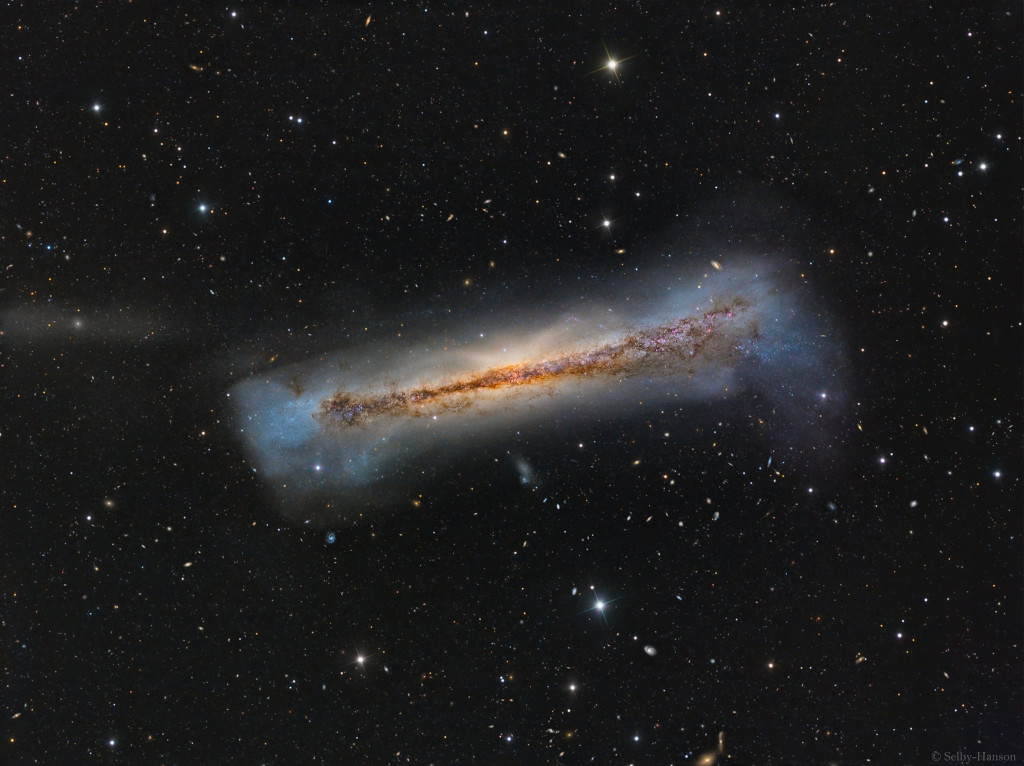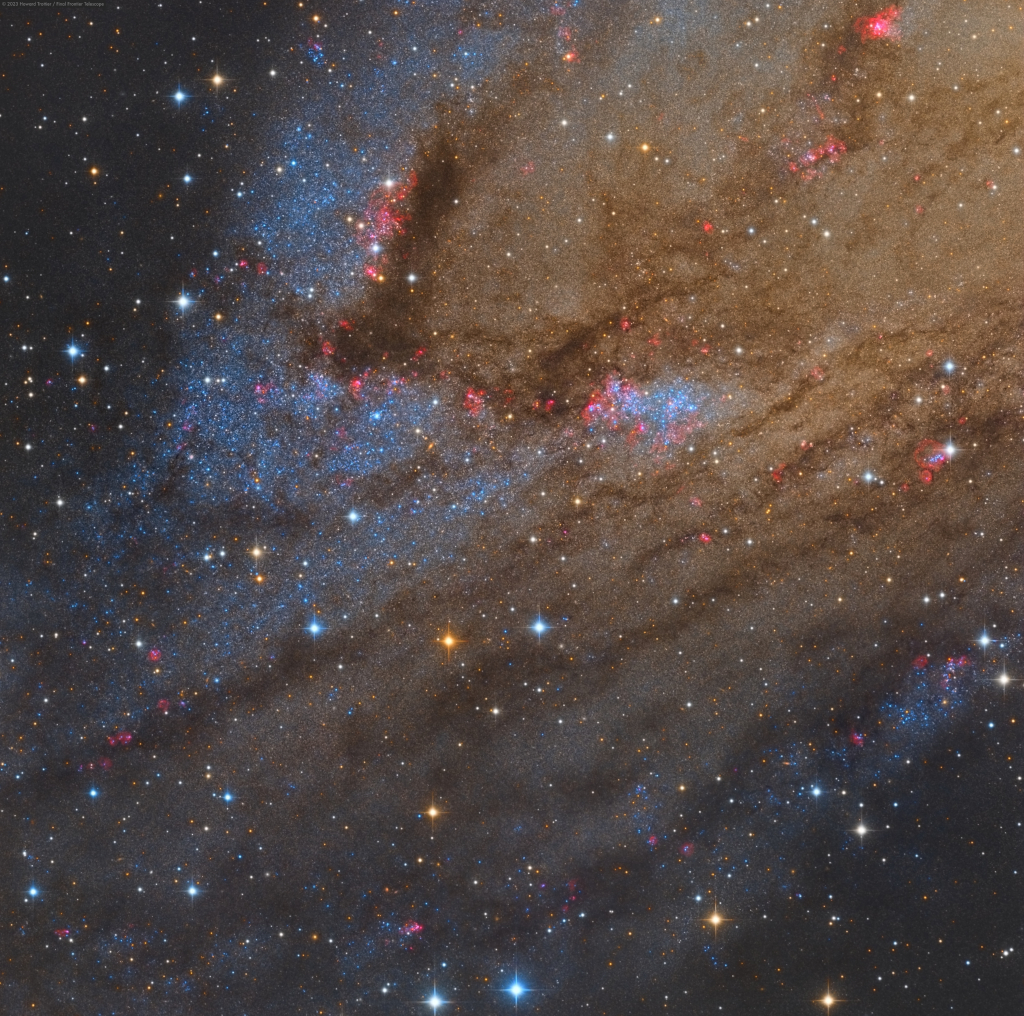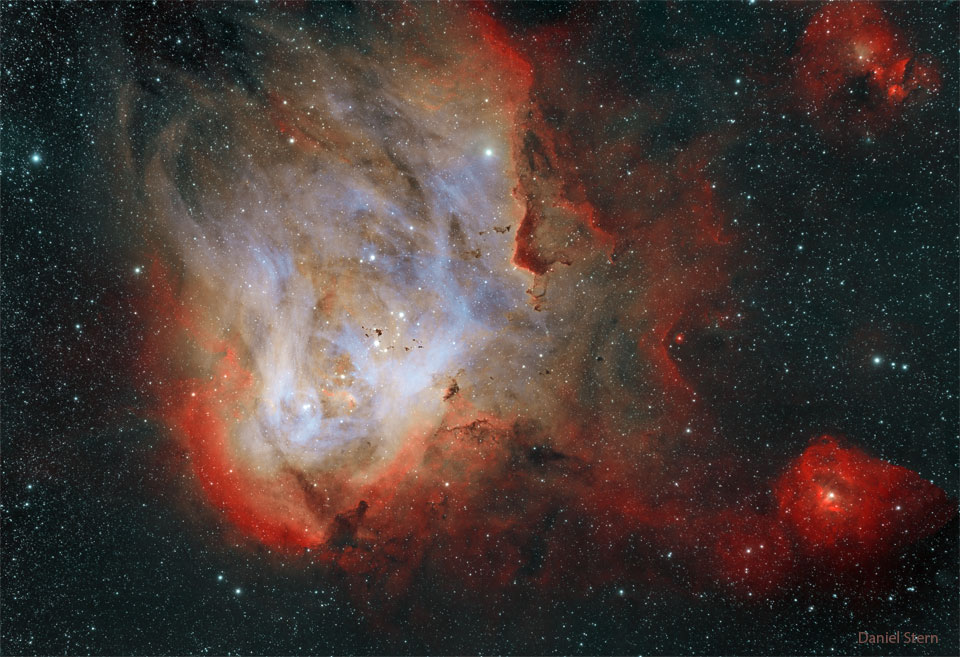Blog
Sharp telescopic views of NGC 3628 show a puffy galactic disk divided by dark dust lanes. Of course, this portrait of the magnificent, edge-on spiral galaxy puts some astronomers in mind of its popular moniker, the Hamburger Galaxy. It also reveals a small galaxy nearby (below), likely a satellite of NGC 3628, and a very faint but extensive tidal tail. The drawn out tail stretches for about 300,000 light-years, even beyond the left edge of the frame. NGC 3628 shares its neighborhood in the local universe with two other large spirals M65 and M66 in a grouping otherwise known as the Leo Triplet. Gravitational interactions with its cosmic neighbors are likely responsible for creating the tidal tail, as well as the extended flare and warp of this spiral’s disk. The tantalizing island universe itself is about 100,000 light-years across and 35 million light-years away in the northern springtime constellation Leo.

Eugene “Jug” Ammons (April 14, 1925 – August 6, 1974), also known as “The Boss”, was an American jazz tenor saxophonist. The son of boogie-woogie pianist Albert Ammons, Gene Ammons is remembered for his accessible music, steeped in soul and R&B.
Born in Chicago, Illinois, Ammons studied music with instructor Walter Dyett at DuSable High School. Ammons began to gain recognition while still at high school when in 1943, at the age of 18, he went on the road with trumpeter King Kolax‘s band. In 1944, he joined the band of Billy Eckstine (who bestowed on him the nickname “Jug” when straw hats ordered for the band did not fit), playing alongside Charlie Parker and later Dexter Gordon. Performances from this period include “Blowin’ the Blues Away,” featuring a saxophone duel between Ammons and Gordon. After 1947, when Eckstine became a solo performer, Ammons then led a group, including Miles Davis and Sonny Stitt, that performed at Chicago’s Jumptown Club. In 1949, Ammons replaced Stan Getz as a member of Woody Herman‘s Second Herd, and then in 1950 formed a duet with Sonny Stitt.
more...Matima Kinuani Mpiosso April 14th 1951-1996 Zairian Guitarist and leader of the group Za’iko Langa Langa which he formed while he was in school. He combined Zairian folk tunes with rock to produce an original sound that was popular in Europe and Japan. Arthritis stopped him from playing before his early death.
more...Ali Akbar Khan (14 April 1922 – 18 June 2009) was an Indian Hindustani classical musician of the Maihar gharana, known for his virtuosity in playing the sarod. Trained as a classical musician and instrumentalist by his father, Allauddin Khan, he also composed numerous classical ragas and film scores. He established a music school in Calcutta in 1956, and the Ali Akbar College of Music in 1967, which moved with him to the United States and is now based in San Rafael, California, with a branch in Basel, Switzerland.
Khan was instrumental in popularizing Indian classical music in the West, both as a performer and as a teacher. He first came to America in 1955 on the invitation of violinist Yehudi Menuhin and later settled in California. He was a Distinguished Adjunct Professor of Music at the University of California, Santa Cruz.
Khan was accorded India’s second highest civilian honour, the Padma Vibhushan, in 1989. Nominated five times for the Grammy Award, Khan was also a recipient of the MacArthur Fellowship and the National Endowment for the Arts‘ National Heritage Fellowship.
more...Fandango:
Each copla (verse) of the Fandangos de Huelva contains six sets of twelve counts, and dancers usually perform several verses of the song, or trade off performing a verse with another dancer.
In a performance, the guitarist plays two or four sets of estribillos before each copla. The singer may also sing the estribillo before the first copla.
When performed in the traditional, regional style, steps are characterized by beautiful leg gestures, flicks of the feet, jota steps and jumps, escuela bolera steps and patterns, a small amount of taconeo/zapateado, castanets, and a distinctive arched line in the back of the dancer – torcido – which produces a spiraling effect.
The dance is also often performed aflamencada, in a flamenco style that includes footwork, flamenco marking steps and cues, and llamadas and remates that are similar to those found in Bulerías.
more...The large stellar association cataloged as NGC 206 is nestled within the dusty arms of the neighboring Andromeda galaxy along with the galaxy’s pinkish star-forming regions. Also known as M31, the spiral galaxy is a mere 2.5 million light-years away. NGC 206 is found right of center in this sharp and detailed close-up of the southwestern extent of Andromeda’s disk. The bright, blue stars of NGC 206 indicate its youth. In fact, its youngest massive stars are less than 10 million years old. Much larger than the open or galactic clusters of young stars in the disk of our Milky Way galaxy, NGC 206 spans about 4,000 light-years. That’s comparable in size to the giant stellar nurseries NGC 604 in nearby spiral M33 and the Tarantula Nebula in the Large Magellanic Cloud.

Lowell Thomas George (April 13, 1945 – June 29, 1979) was an American singer, songwriter, multi-instrumentalist, and record producer, who was the primary guitarist, vocalist, songwriter and founder/leader for the rock band Little Feat.
Lowell George was born in Hollywood, California, the son of Willard H. George, a furrier who raised chinchillas and supplied furs to the movie studios.
more...John William “Jack” Casady (born April 13, 1944) is an American bass guitarist, best known as a member of Jefferson Airplane and Hot Tuna. Jefferson Airplane became the first successful exponent of the San Francisco Sound. Singles including “Somebody to Love” and “White Rabbit” charted in 1967 and 1968. Casady, along with the other members of Jefferson Airplane, was inducted into the Rock and Roll Hall of Fame in 1996.
Casady was born in Washington D.C., the son of Mary Virginia (née Quimby) and William Robert Casady. His father was of half Irish Protestant and half Polish Jewish ancestry. His mother was a relative of aviator Harriet Quimby; some of her family had been in North America since the 1600s.
First playing as a lead guitarist with the Washington, D.C.-area rhythm and blues band The Triumphs, he switched to bass during his high school years, and while still underage (and with a forged I.D.) played the Washington D.C. club scene, backing artists such as Little Anthony and the Imperials.
more...Albert Leornes Greene (born April 13, 1946), known professionally as Al Green, is an American singer, songwriter, pastor and record producer best known for recording a series of soul hit singles in the early 1970s, including “Take Me to the River“, “Tired of Being Alone“, “I’m Still in Love with You“, “Love and Happiness“, and his signature song, “Let’s Stay Together“. After his girlfriend died by suicide, Green became an ordained pastor and turned to gospel music. He later returned to secular music. Green was inducted into the Rock and Roll Hall of Fame in 1995. He was referred to on the museum’s site as being “one of the most gifted purveyors of soul music”. He has also been referred to as “The Last of the Great Soul Singers”. Green is the winner of 11 Grammy Awards, including the Grammy Lifetime Achievement Award. He has also received the BMI Icon award and is a Kennedy Center Honors recipient. He was included in the Rolling Stone list of the 100 Greatest Artists of All Time, ranking at No. 65, as well as its list of the 100 Greatest Singers, at No. 14.
Albert Leornes Greene was born on April 13, 1946, in Forrest City, Arkansas.
more...Dub and reggae pioneer Jah Shaka has died, his family have confirmed.
Fans said the singer, producer and label owner also known as Zulu Warrior was “the greatest soundman that ever lived”.
Shaka was at the helm of sound system culture in London, releasing some of the scene’s most seminal records and spearheading the influential Jah Shaka Sound System, which he began operating and touring in the 1970s.
more...A gaseous nebula where star formation takes place. Cataloged as IC 2944, the Running Chicken Nebula spans about 100 light years and lies about 6,000 light years away toward the constellation of the Centaur (Centaurus). The featured image, shown in scientifically assigned colors, was captured recently in a 16-hour exposure over three nights. The star cluster Collinder 249 is visible embedded in the nebula’s glowing gas. Although difficult to discern here, several dark molecular clouds with distinct shapes can be found inside the nebula.

Herbert Jeffrey Hancock (born April 12, 1940) is an American jazz pianist, keyboardist, bandleader, and composer. Hancock started his career with trumpeter Donald Byrd‘s group. He shortly thereafter joined the Miles Davis Quintet, where he helped to redefine the role of a jazz rhythm section and was one of the primary architects of the post-bop sound. In the 1970s, Hancock experimented with jazz fusion, funk, and electrostyles, using a wide array of synthesizers and electronics. It was during this period that he released perhaps his best-known and most influential album, Head Hunters.
Hancock’s best-known compositions include “Cantaloupe Island“, “Watermelon Man“, “Maiden Voyage“, and “Chameleon“, all of which are jazz standards. During the 1980s, he enjoyed a hit single with the electronic instrumental “Rockit“, a collaboration with bassist/producer Bill Laswell. Hancock has won an Academy Award and 14 Grammy Awards, including Album of the Year for his 2007 Joni Mitchell tribute album River: The Joni Letters, becoming only the second jazz album to win the award after Getz/Gilberto in 1965.
Since 2012, Hancock has served as a professor at the University of California, Los Angeles, where he teaches at the UCLA Herb Alpert School of Music. He is also the chairman of the Herbie Hancock Institute of Jazz (formerly known as the Thelonious Monk Institute of Jazz until 2019).
Hancock was born in Chicago, the son of Winnie Belle (née Griffin), a secretary, and Wayman Edward Hancock, a government meat inspector. His parents named him after the singer and actor Herb Jeffries. He attended Hyde Park High School. Like many jazz pianists, Hancock started with a classical education. He started playing piano when he was seven years old, and his talent was recognized early. Considered a child prodigy, he played the first movement of Mozart‘s Piano Concerto No. 26 in D Major, K. 537 (Coronation) at a young people’s concert on February 5, 1952, with the Chicago Symphony Orchestra (led by CSO assistant conductor George Schick) at age 11.
more...Johnny Dodds (; April 12, 1892 – August 8, 1940) was an American jazz clarinetist and alto saxophonist based in New Orleans, best known for his recordings under his own name and with bands such as those of Joe “King” Oliver, Jelly Roll Morton, Lovie Austin and Louis Armstrong. Dodds was the older brother of the drummer Warren “Baby” Dodds, one of the first important jazz drummers. They worked together in the New Orleans Bootblacks in 1926. Dodds is an important figure in jazz history. He was the premier clarinetist of his era and, in recognition of his artistic contributions, he was posthumously inducted into the Jazz Hall of Fame. He has been described as “a prime architect in the creation of the Jazz Age.”
Dodds was born in Waveland, Mississippi. His childhood environment was a musical one. His father and uncle were violinists, his sister played a melodeon, and in adolescence Johnny sang high tenor in the family quartet. According to legend, his instrumental skill began with a toy flute which had been purchased for his brother, Warren “Baby” Dodds. He was known for his serious and reserved manner as well as his “funky blues playing,” which earned him the nickname “toilet.
more...Theodore Roosevelt “Hound Dog” Taylor (April 12, 1915 – December 17, 1975) was a Chicago bluesguitarist and singer.
Taylor was born in Natchez, Mississippi, in 1915, though some sources say 1917. He first played the piano and began playing the guitar when he was 20. He moved to Chicago in 1942.
Taylor had a condition known as polydactylism, which resulted in him having six fingers on both hands. As is usual with the condition, the extra digits were rudimentary nubbins and could not be moved. One night, while drunk, he cut off the extra digit on his right hand using a straight razor.
He became a full-time musician around 1957, but remained unknown outside the Chicago area, where he played small clubs in black neighborhoods and at the open-air Maxwell Street Market. He was known for his electrified slide guitar playing (roughly styled after that of Elmore James), his cheap Japanese Teiscoguitars, and his raucous boogie beats. In 1967, Taylor toured Europe with the American Folk Blues Festival, performing with Little Walter and Koko Taylor.
https://www.youtube.com/watch?v=8ueJQiwaVoA
more...More Posts
- The Cosmos with M102
- Rashied Ali Day
- James Cotton Day
- Willie Dixon Day
- World Fusion with AKA Trio
- Daily Roots with Jennifer Lara
- The Cosmos with NGC 1073
- Maytisyahu Day
- Stanley Clarke Day
- Apostolos Nikolaidis Day
- Andrew Hill Day
- World Music with Carlos Núñez
- Daily Roots with Paula Clarke
- The Cosmos with M83
- Little Eva Day
- Julian Priester Day
- World Music with RAJERY
- Daily Roots with Angela Prince
- The Cosmos with Sh2-101
- John Medeski Day